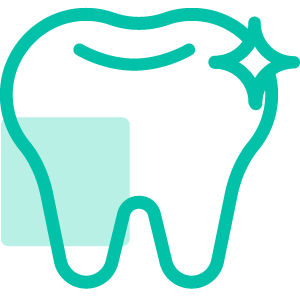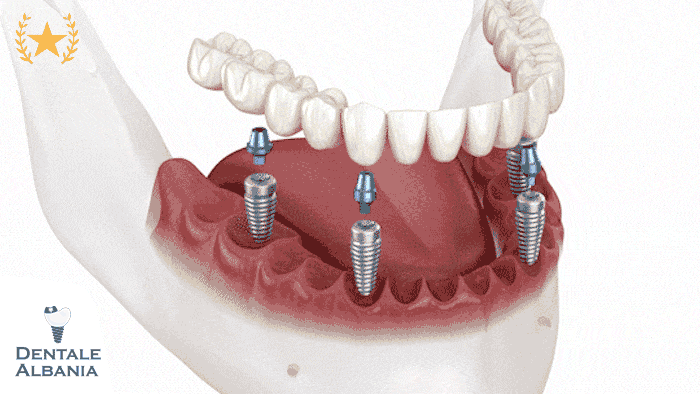Table of Contents
ToggleWhat Are All-on-8 Dental Implants and How Do They Work?

All-on-8 dental implants are an advanced full-arch restoration system designed for individuals with complete tooth loss in the upper or lower jaw. This innovative solution involves the placement of eight dental implants per jaw, which act as strong, permanent anchors for a full set of fixed prosthetic teeth. It’s ideal for patients who are looking for a more stable and long-term alternative to removable dentures, especially those suffering from significant bone loss or seeking enhanced durability.
Unlike traditional dentures, which can move or slip during speech or eating, All-on-8 implants provide a firm, natural-feeling foundation. They integrate with the jawbone (a process known as osseointegration), preventing bone resorption and offering a functional and aesthetic solution that mimics the strength of natural teeth.
The system is also an improvement over single implant restorations, which require one implant per tooth — a costly and lengthy process for full-mouth rehabilitation. All-on-8 simplifies this by securing an entire arch of teeth on just eight titanium or zirconia implants, making it more efficient and accessible for patients needing full-mouth reconstruction.
What Is the Difference Between All-on-4, All-on-6, and All-on-8?
- All-on-4 uses just four implants and is suitable for patients with minimal bone volume.
- All-on-6 adds two more implants, offering better force distribution and support.
- All-on-8, however, provides the highest stability and durability, making it ideal for those with significant chewing needs or bone density challenges.
The number of implants directly influences the distribution of biting forces and the longevity of the prosthetics. More implants mean less stress per implant, which can prevent overload and extend the lifespan of the restoration.
How Do All-on-8 Implants Provide Enhanced Stability?
- Each of the eight implants is strategically angled and positioned to maximize bone contact and anchor securely.
- This allows for optimal force distribution during chewing, reducing the risk of implant failure or discomfort.
- It’s especially useful for patients with complex oral health issues or those with jawbone atrophy, as the increased number of implants compensates for bone loss and creates a more solid base for the prosthesis.
All-on-8 implants not only restore smile aesthetics but also facial structure, as the support they provide prevents the sunken look often associated with complete tooth loss.
What Is the Difference Between All-on-4, All-on-6, and All-on-8?
When considering full-mouth dental restoration, understanding the differences between All-on-4, All-on-6, and All-on-8 dental implants is key to making an informed decision. Each system is designed to support a full arch of prosthetic teeth, but they differ in implant quantity, support level, and ideal patient scenarios.
Number of Implants and Force Distribution
- All-on-4 uses four implants per arch, strategically placed to maximize support using minimal hardware. It’s ideal for patients with moderate bone loss and offers a cost-effective entry point into fixed implant solutions.
- All-on-6 increases stability with six implants, distributing the bite forces more evenly and reducing stress on each implant. It’s suitable for those with moderate to good bone density who want improved longevity.
- All-on-8 provides the highest level of support by using eight implants per arch. This system ensures optimal force distribution, even for patients with severe bone atrophy, and supports larger, more durable prosthetics.
Suitability Based on Jawbone Condition and Budget
- All-on-4 is generally recommended for patients with limited bone volume or those looking for a faster, less invasive option.
- All-on-6 suits individuals who want greater durability and can tolerate a slightly more involved procedure.
- All-on-8 is the go-to for patients who want maximum prosthetic stability, especially in cases of advanced bone loss or higher chewing demands.
Durability and Longevity
- The more implants placed, the better the load is shared during chewing and speaking, which helps preserve both the implants and the jawbone.
- All-on-8 implants typically have the longest lifespan, thanks to the superior mechanical support and even pressure distribution.
In summary, the main difference lies in the number of implants and the resulting functional and structural benefits. While All-on-4 and All-on-6 are excellent solutions for many, All-on-8 stands out as the most comprehensive and durable choice, especially when long-term success and bone health are top priorities.
Who Should Consider All-on-8 Dental Implants?

All-on-8 dental implants are a transformative solution for patients who have experienced total or near-total tooth loss and are seeking a permanent, stable, and natural-looking restoration. Unlike removable dentures or partial implants, this method offers the most secure full-arch solution — both functionally and aesthetically.
Best for Patients with Full Upper or Lower Jaw Tooth Loss
- The All-on-8 system is designed specifically for patients who are edentulous (have lost all teeth) in the upper or lower arch.
- It provides a fixed, non-removable solution that feels and functions like natural teeth, restoring not just your smile, but your ability to chew, speak, and enjoy daily life without discomfort or embarrassment.
Ideal When a Patient Prefers Fixed Teeth Over Removable Dentures
- Many patients are frustrated by the slippage, discomfort, and maintenance required by removable dentures.
- All-on-8 implants eliminate the need for adhesives and offer a secure fit that doesn’t move — meaning no more restrictions on what you can eat, and no fear of your prosthesis falling out during conversations or meals.
Recommended for Those Seeking Long-Term Oral Health Benefits
- All-on-8 isn’t just about aesthetics — it also promotes better bone preservation.
- By stimulating the jawbone with multiple implants, it helps prevent bone resorption, which typically occurs after tooth loss.
- Patients benefit from improved facial structure, reduced gum recession, and a younger-looking appearance due to retained bone volume.
Can All-on-8 Be Used in Cases of Severe Bone Loss?
- Yes, and this is one of its major advantages. The All-on-8 method often uses angled implant placement and basal implant protocols, making it suitable even for patients with significant jawbone atrophy.
- In many Turkish dental clinics, modern techniques allow implants to be placed without bone grafting, thanks to 3D scanning and immediate-load protocols, reducing both costs and treatment time.
- Patients who were previously told they lacked the bone density for implants may now qualify for All-on-8 treatment, especially in clinics experienced with complex cases.
Why Choose All-on-8 Implants in Turkey?
Over the past decade, Turkey has become a leading destination for dental tourism, offering world-class treatments like All-on-8 dental implants at significantly reduced prices — without compromising on quality or safety. Here’s why more patients are traveling to Turkey for their full-arch implant restorations:
Affordability Without Compromising Quality
- One of the biggest draws to Turkey is the cost-effectiveness of dental care.
- All-on-8 dental implants in Turkey typically cost a fraction of what they do in the UK, yet they use the same high-end materials, such as zirconia and titanium implants from globally recognized brands.
- Lower operational costs and government support for medical tourism allow Turkish clinics to offer top-tier care at lower prices.
Advanced Clinics and Experienced Surgeons
- Turkish dental clinics are equipped with state-of-the-art technology, including 3D scanning, CAD/CAM design, and guided surgery tools.
- Most implantologists in Turkey are internationally trained and highly experienced, often performing hundreds of full-mouth implant restorations per year.
- Many clinics are accredited, follow European hygiene standards, and offer multilingual support for international patients.
Full-Service Packages for International Patients
- To make the experience seamless and stress-free, clinics often offer all-inclusive packages that cover:
- Airport-hotel-clinic transfers
- Hotel accommodation (4–5-star options)
- Panoramic X-rays or 3D scans
- Local anesthesia or IV sedation
- Medication, including antibiotics, painkillers, and mouthwash
- Post-op checkups and full coordination of care
- These packages are tailored for international patients and designed to be both cost-effective and comprehensive.
High International Standards and Patient Satisfaction
- Turkish dental tourism clinics maintain excellent reviews and high patient satisfaction, often reflected in thousands of 5-star Google ratings and video testimonials.
- Clinics that specialize in full-arch solutions like All-on-8 are especially known for their efficiency, hospitality, and attention to detail — from consultation to aftercare.
How Much Do All-on-8 Dental Implants Cost in Turkey?
- The cost of All-on-8 implants in Turkey typically ranges from £3,200 to £5,000 per arch.
- This includes:
- The surgical procedure
- 8 dental implants
- A temporary prosthesis (fitted the same week)
- A permanent fixed bridge, often made of zirconia or ceramic
- Many packages also include transportation, hotel stay, and follow-up appointments, ensuring exceptional value for international patients.
How Does the Price Compare to the UK?
- In the UK, All-on-8 treatment usually costs between £20,000 and £30,000 per arch, depending on the clinic, implant brand, and prosthetic material used.
- That’s a difference of over 65% in savings, even when factoring in the cost of travel and accommodation.
- Despite the price difference, the implant materials and clinical standards in Turkey are often equal to — or even surpass — those in private UK clinics.
Why Choose All-on-8 Implants in Albania?

While Turkey has long dominated the dental tourism scene, Albania has rapidly emerged as a rising star in Europe for high-quality, affordable implant dentistry. For patients considering All-on-8 dental implants, Albania offers an exceptional balance of cost savings, clinical excellence, and personalized care — all within a few hours’ flight from major European cities.
Affordability with No Compromise on Quality
- The cost of All-on-8 implants in Albania is significantly lower than in the UK or Western Europe — often ranging between £3,500 and £5,500 per arch, depending on the clinic and materials used.
- Albanian clinics often source implants and prosthetics from globally recognized brands, such as Straumann or Nobel Biocare, ensuring European-standard quality.
- Lower living and operational costs allow Albanian dental providers to offer world-class care at a much more accessible price.
Modern Clinics and Expert Surgeons
- Top dental clinics in Tirana and other major cities are equipped with cutting-edge diagnostic and surgical technology, including 3D CBCT scans, CAD/CAM milling systems, and guided implantology software.
- Albania’s leading implantologists are often trained internationally, with many having completed postgraduate training in countries like Italy, Germany, or the US.
- Clinics focused on implantology and full-mouth restorations often have surgeons who perform hundreds of procedures like All-on-8 each year.
Full-Service Packages for International Patients
- To attract dental tourists, many Albanian clinics offer all-inclusive treatment packages that cover:
- Airport pickup and drop-off
- 4-star or 5-star hotel accommodation
- Local transportation between clinic and hotel
- Consultation and panoramic X-rays or 3D scans
- All surgical and prosthetic procedures
- Medications (painkillers, antibiotics, mouthwash)
- Follow-up checkups and digital scans
- These packages are designed to ensure a stress-free and smooth experience, often including English-speaking coordinators for international patients.
International Standards and High Patient Satisfaction
- Albanian clinics are licensed under EU health regulations and frequently undergo inspections to meet cross-border healthcare compliance.
- Patients traveling from the UK, Italy, Germany, and Switzerland report high levels of satisfaction, not just with their new smile — but also with the friendly hospitality, personalized care, and fast turnaround times.
- Online reviews and before-and-after transformations often highlight the remarkable value and professionalism of Albanian dental teams.
What Are the Pros and Cons of All-on-8 Dental Implants?
Choosing All-on-8 dental implants is a major decision, and understanding the advantages and disadvantages of this treatment can help patients make a more informed choice. While it’s often considered one of the most advanced and stable full-mouth restoration options, it’s not the right fit for everyone.
What Are the Advantages of All-on-8 Dental Implants?
- Maximum Stability and Functionality
- Eight implants offer superior support and even force distribution across the jaw, making the prosthesis feel more natural.
- Excellent for strong chewing capacity, even with hard or sticky foods.
- Permanent, Fixed Solution
- The full-arch prosthesis is screw-retained or cemented, meaning there’s no need to remove it like with traditional dentures.
- Patients enjoy the feeling of having “real teeth” again.
- Reduced Bone Loss Over Time
- Implants stimulate the jawbone, preventing bone resorption that typically happens with removable dentures.
- This helps preserve facial structure and avoid the “sunken” look.
- Long-Term Cost Efficiency
- While the upfront cost is higher than dentures or All-on-4, the durability and reduced need for repairs can make All-on-8 more economical in the long run.
- Immediate Results
- In most cases, patients leave the clinic with temporary fixed teeth on the same day as surgery.
- This allows for restored function and aesthetics during healing.
- Ideal for Patients with Severe Tooth Loss
- Especially beneficial for those with full upper or lower arch edentulism looking for a stable, long-lasting solution.
Are There Any Disadvantages to All-on-8 Dental Implants?
- Higher Upfront Cost
- More implants mean higher treatment costs, both for the surgical phase and prosthetic work.
- This option may not fit all budgets, although it is more affordable in countries like Turkey or Albania.
- More Invasive Surgery
- Placing eight implants involves longer surgery time, and a more complex healing process compared to All-on-4 or All-on-6.
- Requires good general health and may not be suitable for all elderly or medically compromised patients.
- Not Always Necessary
- In cases where jawbone condition is good and force distribution needs are moderate, All-on-6 may offer a better value-to-benefit ratio.
- Dentists may recommend fewer implants when clinically sufficient.
- Requires a Skilled Implantologist
- Precise implant placement is critical for long-term success. This procedure should be done only by experienced professionals, especially when bone atrophy is involved.
How Should You Care for All-on-8 Dental Implants?

Caring for All-on-8 dental implants is essential for maintaining their function, appearance, and longevity. While they don’t get cavities like natural teeth, they still require daily hygiene and regular maintenance to avoid complications like gum disease or implant failure. With the right care routine, these implants can last decades.
What Daily Cleaning Routine Should You Follow?
- Brush Twice Daily
- Use a soft-bristled electric toothbrush or an implant-specific toothbrush.
- Focus on the gumline and under the bridge to prevent plaque buildup.
- Use Water Flossers or Oral Irrigators
- Devices like Waterpik® can reach under fixed prosthetics where traditional floss cannot.
- Especially effective for removing debris and reducing the risk of peri-implantitis.
- Clean Under the Bridge
- Use super floss, interdental brushes, or proxy brushes to clean between the gums and prosthetic base.
- Neglecting this area can lead to inflammation and bad breath.
- Antibacterial Mouthwash
- Rinsing with a non-alcoholic, antibacterial mouthwash helps reduce bacteria and keep gums healthy.
What Are the Best Implant Cleaning Tools?
- Implant-Specific Toothbrushes – Smaller heads for better reach and gentler bristles.
- Interdental Brushes – Great for cleaning between implants and tight spaces.
- Super Floss – Designed for dental bridges and wide spaces beneath prostheses.
- Water Flossers – Especially helpful for people with dexterity issues or limited access.
How Often Should You See Your Dentist?
- Bi-Annual Checkups
- Visit your implantologist every 6 months for professional cleanings and checkups.
- Dentists will inspect the implant connections, gum health, and bone levels.
- Professional Deep Cleaning
- Special tools are used that won’t scratch or damage the prosthetic or implants.
- These appointments help remove tartar and address early signs of complications.
What Lifestyle Habits Help Protect Your Implants?
- Avoid Smoking
- Smoking reduces blood flow and increases the risk of implant failure.
- It also affects healing and long-term gum health.
- Protect Against Teeth Grinding
- Ask about a night guard if you clench or grind your teeth (bruxism).
- Prolonged grinding can place stress on the implants and prosthesis.
- Eat a Balanced Diet
- Good nutrition supports healing and bone health.
- Avoid overly sticky or hard foods during the first few months of healing.
How Long Do All-on-8 Dental Implants Last?
One of the most compelling reasons patients choose All-on-8 dental implants is their impressive longevity. With proper care, this advanced full-arch restoration solution can last decades — often 15 to 20+ years — and in many cases, a lifetime.
What Is the Typical Lifespan of All-on-8 Implants?
- Implant Fixtures
The titanium or zirconia implants surgically placed into the jawbone are incredibly durable. If osseointegration is successful and well-maintained, these can last a lifetime. - Prosthetic Bridge
The bridge (artificial teeth) attached to the implants typically lasts 10 to 15 years, depending on the material used and how well it’s cared for. Zirconia and ceramic options last longer than acrylic or composite materials. - Long-Term Maintenance
Regular checkups, good oral hygiene, and avoiding harmful habits like smoking or teeth grinding can significantly extend the lifespan of both implants and prosthetics.
What Factors Influence Longevity?
- Oral Hygiene
Daily brushing, flossing (or water flossing), and cleaning under the bridge are essential. Neglecting hygiene can lead to peri-implantitis, a gum infection that can result in implant failure. - Lifestyle Choices
Smoking, alcohol overuse, or poor diet can impact healing and long-term implant success. Bruxism (teeth grinding) can also wear down prosthetics faster. - Quality of Materials and Placement
Clinics using high-grade materials and guided 3D imaging for precision placement tend to deliver better long-term results. This is why choosing experienced implantologists is critical. - Routine Dental Visits
Professional cleaning and monitoring every 6 months help detect early issues before they escalate and ensure the prosthetics remain in excellent condition.
What Are the Signs an Implant or Prosthesis Needs Replacement?
- Gum inflammation or bleeding around the implants
- Loosening of the bridge or abutments
- Chips, cracks, or wear on prosthetic teeth
- Persistent pain or discomfort
Catching these signs early allows your dentist to intervene before more significant damage occurs — increasing your chances of keeping the implants functional for life.









